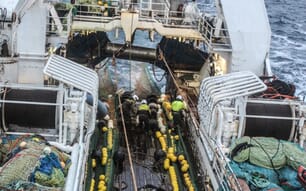If successful, this will be the first time whiting (Merlangius merlangus) and Rockall haddock are MSC-certified. The fisheries will be benchmarked against the MSC Fisheries Standard for sustainable fishing, with the hope of joining SFSAG’s other MSC-certified fisheries.
An exemplary example of a sustainable commitment
SFSAG was the first UK fishery to put North Sea cod into MSC assessment in 2016, with a decision due later this year. If the cod fishery and these other five are successful, this will take the number of MSC certified fisheries for the group up to eight. SFSAG has two other MSC certified fisheries catching haddock and saithe that have been certified since 2010 and 2013 respectively.
Scottish haddock
Rockall haddock is the same species as its North Sea and West of Scotland friends (Melanogrammus aeglefinus), but from a different population. Spawning happens between March and May, however, the haddock is available all year round.
Haddock is the most important demersal whitefish species to Scottish fishermen. Over 27,000 tonnes of haddock were landed into Scotland by Scottish vessels in 2015 worth £37 million1. Almost 4,000 tonnes of this is Rockall haddock.
Not only is it a valuable species, a study2 to assess the benefits of the MSC certification of the Scottish North Sea haddock fishery to its supply chain found that after three and a half years:
- "Clear qualitative and quantitative evidence that MSC certification has both maintained market share for North Sea haddock and opened up new markets
- Anecdotal evidence that some processors and wholesalers will pay up to an additional 10 per cent for MSC-certified haddock
- The transfer of this price premium of up to 10 per cent to those further up the supply chain such as retailers
- Evidence that MSC certification is helping to future-proof the industry as events such as the Glasgow 2014 Commonwealth Games and institutional buyers adopting sustainable fish-buying policies
- Improved reputational benefits for the fishing industry, helping to raise consumer confidence and enhancing political credibility."
Hake, whiting and plaice
Hake is increasing in popularity in the UK and, if SFSAG is successful, this will be the second MSC certified hake fishery in the UK. This assessment could increase the supply of MSC labelled UK hake by 13,000 tonnes a year.
Hake, whiting and plaice are being added as a ‘scope extension’ to the currently certified Scottish North Sea haddock fishery. This means that the fishery was already catching these species and their sustainability was taken into account in the original assessment, but its primary focus was haddock3. However, SFSAG has decided to enter these species into MSC assessment as well. If successful, the following species will have MSC certification within the SFSAG Scottish North Sea haddock fisheryi:
- Haddock (Melanogrammus aeglefinus) – North Sea and West of Scotland
- Saithe (Pollachius virens)
- Plaice (Pleuronectes platessa)
- Hake (Merluccius merluccius)
- Whiting (Merlangius merlangus)
These are in addition to the standalone Rockall haddock fishery and the North Sea cod fishery, both of which are currently in MSC assessment.
The biological distribution of hake changed in recent years, resulting in Scottish whitefish fishermen catching larger quantities of the waters around Scotland, and particularly in the northern North Sea4. It is now the sixth most commercially valuable species to the Scottish fishing industry.
Whiting is found in the seas to the east and west of the Shetland Isles, off the north east coast of Scotland, southeast England, the English Channel and in the Irish Sea. It can grow up to 70cm in length. This fishery is able to catch almost 10,000 tonnes this year.
Commercial importance
Landings of hake have increased year on year and in 2015 were worth £16million, up from £14million in 2014, while landings of whiting by Scottish vessels was worth £8.5million in 20155. Over 27,000 tonnes of haddock were landed into Scotland by Scottish vessels in 2015, worth £37 million.
Hake is currently predominantly sent overseas, however the market in the UK for European hake is expanding. Whiting is sold in the UK and overseas equally and Rockall haddock is primarily sold in Scotland during the absence of North Sea haddock throughout the spawning and post-spawning season of March to June.
Mike Park, Chair of SFSAG, said: "The Scottish fishing industry remains committed to sustainable harvesting of the stocks in the waters around our shores. We have much to be proud of as an industry and are keen to showcase our best practice through the gold standard of MSC certification. These latest stocks to enter the certification process will not be the last in what we see as a long line."
1 Provisional Sea Fisheries Statistics 2015, http://www.gov.scot/Topics/Statistics/Browse/Agriculture-Fisheries/provisionalfishstats
2 Study information, Assessment of the Benefits of MSC Certification to a Major UK Fishery and its Supply Chain, available on: http://www.scottishfsag.org/news or for the full report https://www.msc.org/documents/measuring-business-impacts/poseidon-report-into-the-impact-of-msc-certification-on-scottish-haddock/view
3 The sustainability of these non-primary species was taken into account in the original MSC assessment for North Sea haddock.
4 Seafood Scotland, http://www.seafoodscotland.org/ru/responsible-sourcing/top-species/hake.html
5 Provisional Sea Fisheries Statistics 2015, http://www.gov.scot/Topics/Statistics/Browse/Agriculture-Fisheries/provisionalfishstats




